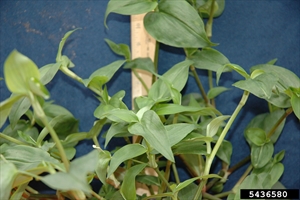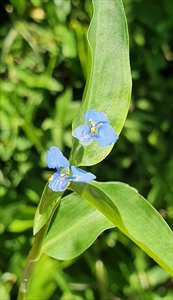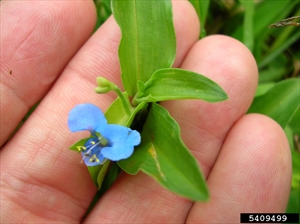- Widespread. Asia, Africa, North, South and Central America, Oceania. In Australia, Fiji, PNG.
- Invasive, long-lived, much-branching, creeping weed of plantations, orchards, vegetable fields, wet pastures, field borders, roadsides, gardens and wasteland. Mainly problem in open, moist habitats with disturbed soils, and young crops. Withstands temporary flooding.
- Soft, smooth, fleshy stems, up to 100 cm long, enclosed by sheath at base. Leaves, 4-6 cm long, alternate along stems, with hairs on margins. Flowers, small clusters in upper leaf forks, three bright blue petals, opening in morning. Seeds, dark-brown. Roots from nodes along stems.
- Spread: vegetative propagation; seeds; stem pieces; water; soil; as a medicinal plant and ornamental.
- Biosecurity: moderately high risk of introduction; used as an ornamental. Available on internet.
- Biocontrol: Little known.
- Cultural control: hand weed or hoe (but stem pieces regrow); cultivation (mechanical or animal drawn); cover crops; increase crop density.
- Chemical control: in Australia: bentazone; glyphosate; fluroxypyr; pendimethalin. In Fiji, metsulfuron-methyl.
Pacific Pests, Pathogens and Weeds - Online edition
Pacific Pests, Pathogens, Weeds & Pesticides
Commelina (460)
Commelina; it is also known as wandering Jew, baby dayflower, or scurvy weed. CABI prefers the name spreading dayflower.
Commelina diffusa. It has also been known as Commelina nidiflora and Commelina communis. It is similar to another plant also called wandering Jew, Commelina benghalensis. It is a member of the Commelinaceae.
AUTHORS Grahame Jackson, Aradhana Deesh & Mani Mua
Adapted from Wandering Jew (Commelina diffusa) (2018) Weeds of SE Qld and Northern NSW. Lucidcentral. (https://www.lucidcentral.org/editors-pick-animal-and-plant-identification-keys/key-to-weeds-of-se-qld-and-northern-nsw); and additional information from CABI (2019) Commelina diffusa (wandering Jew). Invasive Species Compendium. (https://www.cabi.org/isc/datasheet/14979); and from Commelina diffusa (2019) Wikipedia. (https://en.wikipedia.org/wiki/Commelina_diffusa). Photo 1 Bruce Ackley, The Ohio State University, Bugwood.org; Photo 3 Forest and Kim Starr, Starr Environmental, Bugwood.org.
Produced with support from the Australian Centre for International Agricultural Research under project HORT/2016/185: Responding to emerging pest and disease threats to horticulture in the Pacific islands, implemented by the University of Queensland, in association with the Pacific Community and Koronivia Research Station, Ministry of Agriculture, Fiji.






